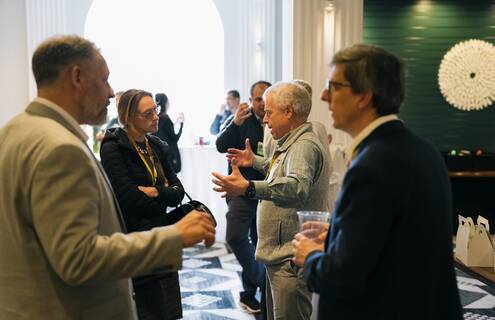
When you submit your grants for external funding, they want to see preliminary data that will de-risk your project. To get to those focused approaches, you have to take these flying leaps of faith. DIAC will fund that early discovery that’s risky.
Tyler J. Curiel, MD, MPHImmunotherapies such as immune checkpoint blockade drugs have emerged as a game-changer in cancer treatment. Tyler J. Curiel, MD, MPH, Immunology & Cancer Immunotherapy researcher who joined Dartmouth Cancer Center to lead the expansion of cancer immunotherapy research and clinical trials, believes that these drugs represent the biggest advancement that has been made in cancer treatment.
“Cancers that up until now have been death sentences aren’t being treated with immune checkpoint blockade immunotherapy—they’re being cured,” Curiel says.
However, immunotherapy only works for 15-20% of patients. Curiel is determined to change that by exploring why immunotherapy only works for a minority of patients. His lab has identified a new target for immunotherapy, which is not utilized by any currently approved drugs. Curiel hopes to develop a new treatment that is distinct from but complementary to existing immunotherapy drugs to save lives in the clinic.
Seed funding for flying leaps of faith
The good news is that there is support for Curiel’s research ambition. Recently, his and 14 teams all driving advancements in cancer therapeutics, participated in the third cohort of the Dartmouth Innovations Accelerator for Cancer (DIAC), a joint platform of Dartmouth Cancer Center and Dartmouth’s Magnuson Center for Entrepreneurship.
For the first time, DIAC offered both a ten-week curriculum developed in partnership with Simbex, a medical device and development company, and a five-week track, where participants workshopped their projects with biotech innovators and investors on the External Review Panel (ERP). At the end of the cohort, Curiel took home the top prize of $150,000. The funds are critical for Curiel's project, which is not yet established enough to attract grant funding from the National Institutes of Health (NIH) or other peer-reviewed grant opportunities.
“In research and discovery, a hard reality is that when you submit your grants for external funding like NIH, they want to see a lot of preliminary data that will de-risk your project. To get to those focused approaches, you have to take these flying leaps of faith. DIAC will fund that early discovery that’s risky,” says Curiel.
The commercial pipeline
The team of Jiwon Lee, Ralph and Marjorie Crump Assistant Professor of Engineering at Dartmouth's Thayer School of Engineering, has received $75,000 in DIAC funding, which they will use to develop a therapeutic antibody that could be used to treat multiple myeloma, a type of blood cancer.
“Thinking about the commercialization of our technology has been the next critical step, and the unique speakers and lessons DIAC brings each cohort have been key to this,” Lee says.
DIAC’s External Review Panel has been essential in providing direction for their technology, due to their expertise in cancer therapeutics and experience with the biotech industry and startups. Such access to high-level biotech experts is what brings Lee’s team back to DIAC for the third year.
Science meets business
Translation Engineering in Cancer (TEC) Research Program member Katherine Hixon, PhD, received $25,000 in DIAC funding to continue developing a synthetic bone graft substitute, GYROGEL, that could encourage faster bone growth in cancer patients following surgery.
Hixon’s team was able to purchase a ceramic 3D printer that they’re using to create novel scaffolds for their product. With that, they went on to secure another $50,000 in funding, which they’ll use to begin further studies.
Hixon says, “We learned from and connected with successful and relevant med tech entrepreneurs, FDA experts and clinicians who provided critical advice on translating medical technology from lab to market.”
Recognizing potential
John X.J. Zhang, PhD, TEC member and Professor of Engineering at Thayer, and PhD candidate John Molinski received a $15,000 award that allowed them to pivot their concept. They had been looking at using a new type of biomarker for early diagnosis, but Molinski discovered that the approach had potential as a therapeutic too.
“This novel idea came about, and we didn’t have any funding to explore or prove the concept,” Molinski says. “This money played a critical role getting it from idea to reality.”
Zhang and Molinski went on to receive $35,000 in funding at the end of the cohort. Like Curiel, they hope to leverage that money to advance their innovation enough to secure larger grant funding.
The DIAC program has been instrumental in getting innovations off the ground. “DIAC puts you on a path to where you can attract the funding and support you need to get these technologies into the clinic,” says Curiel. Backed by DIAC, Curiel, Lee, Hixon, Zhang and others are motivated to navigate that path of making a difference in the lives of cancer patients.